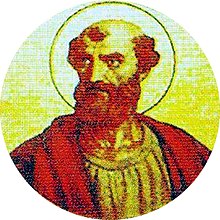Pope Alexander I
|
Pope Saint Alexander I |
|
|---|---|
 |
|
| Papacy began | c. 107 |
| Papacy ended | c. 115 |
| Predecessor | Evaristus |
| Successor | Sixtus I |
| Personal details | |
| Birth name | Alexander |
| Born | 10 January 75 Rome, Roman Empire |
| Died | c. 115 Rome, Roman Empire |
| Sainthood | |
| Feast day | 3 May (?) (West) 16 March (East) |
Pope Alexander I (died c. 115) was the Bishop of Rome from c. 107 to his death c. 115. The Holy See's Annuario Pontificio (2012) identifies him as a Roman who reigned from 108 or 109 to 116 or 119. Some believe he suffered martyrdom under the Roman Emperor Trajan or Hadrian, but this is improbable.
According to the Liber Pontificalis, it was Alexander I who inserted the narration of the Last Supper (the Qui pridie) into the liturgy of the Mass. However, the article on Saint Alexander I in the 1907 Catholic Encyclopedia, written by Thomas Shahan, judges this tradition to be inaccurate, a view shared by both Catholic and non-Catholic experts. It is viewed as a product of the agenda of Liber Pontificalis—this section of the book was probably written in the late 5th century—to show an ancient pattern of the earliest bishops of Rome ruling the church by papal decree.
The introduction of the customs of using blessed water mixed with salt for the purification of Christian homes from evil influences, as well as that of mixing water with the sacramental wine, are attributed to Pope Alexander I. Some sources consider these attributions unlikely. It is certainly possible, however, that Alexander played an important part in the early development of the Church of Rome's emerging liturgical and administrative traditions.
A later tradition holds that in the reign of Emperor Hadrian, Alexander I converted the Roman governor Hermes by miraculous means, together with his entire household of 1,500 people. Saint Quirinus of Neuss, who was Alexander's supposed jailer, and Quirinus' daughter Saint Balbina were also among his converts.
Alexander is said to have seen a vision of the infant Jesus. His remains are said to have been transferred to Freising in Bavaria, Germany in AD 834.
...
Wikipedia
